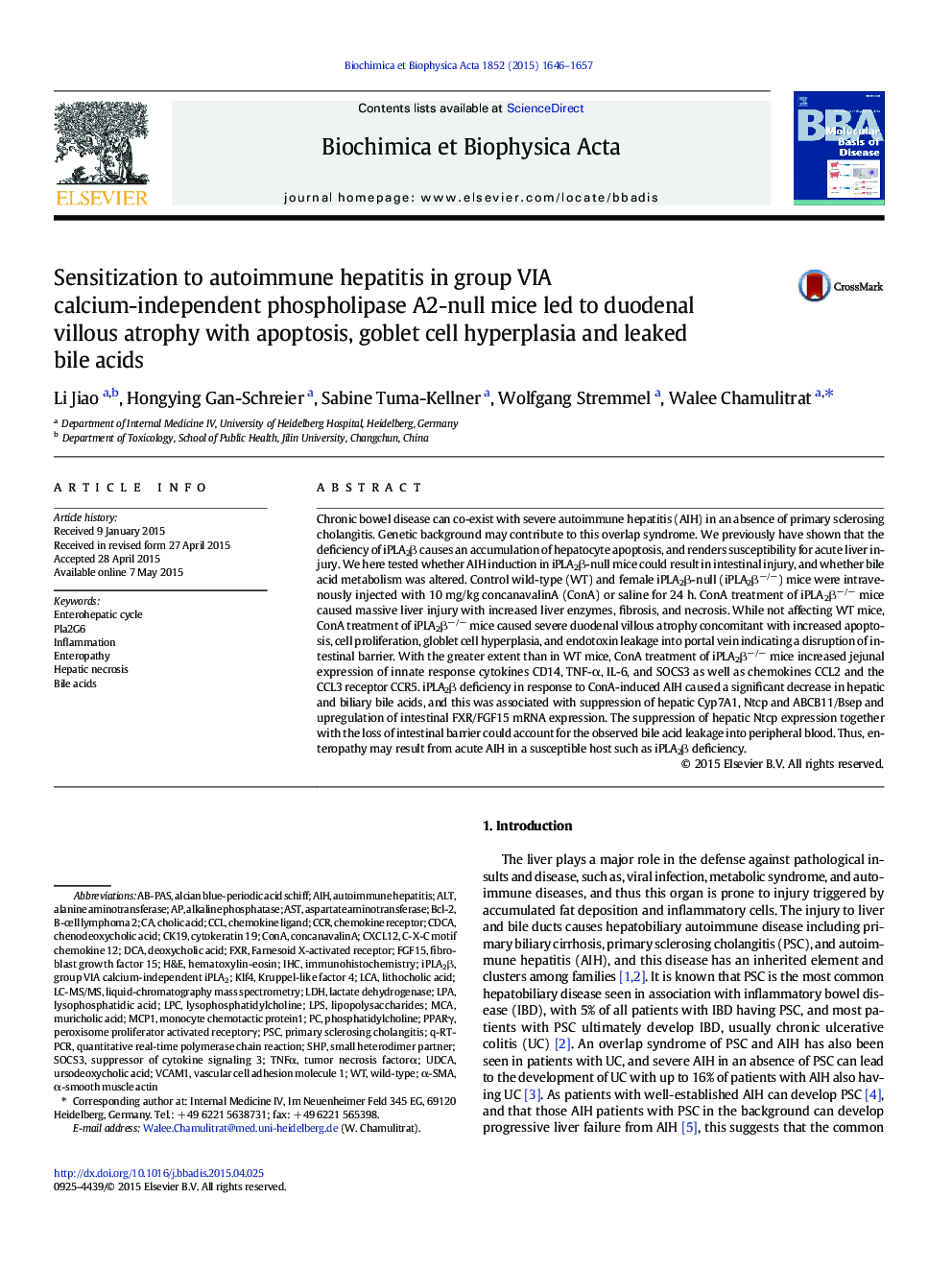| کد مقاله | کد نشریه | سال انتشار | مقاله انگلیسی | نسخه تمام متن |
|---|---|---|---|---|
| 8259735 | 1534644 | 2015 | 12 صفحه PDF | دانلود رایگان |
عنوان انگلیسی مقاله ISI
Sensitization to autoimmune hepatitis in group VIA calcium-independent phospholipase A2-null mice led to duodenal villous atrophy with apoptosis, goblet cell hyperplasia and leaked bile acids
دانلود مقاله + سفارش ترجمه
دانلود مقاله ISI انگلیسی
رایگان برای ایرانیان
کلمات کلیدی
UDCAPPARγLPCMCP1LPACCLCXCL12CDCAAIHFXRQ-RT-PCRC-X-C motif chemokine 12SOCS3KLF4ConACK19FGF15PLA2G6Farnesoid X-activated receptorLiquid-chromatography mass spectrometryVCAM1AB-PASiPLA2βtumor necrosis factorαAlcian blue-periodic acid SchiffDCAα-SMAALTTNFαMCALPSCCRBcl-2PSCSHPH&E - H & ELC-MS/MS - LC-MS / MSAST - آسپارتات ترانس آمینازAspartate aminotransferase - آسپارتات ترانس آمیناز یا AST Alanine aminotransferase - آلانین آمینوترانسفرازAlkaline phosphatase - آلکالین فسفاتاز یا فسفاتاز قلیاییLCA - ارزیابی چرخه حیاتChenodeoxycholic acid - اسید ChenodeoxycholicDeoxycholic acid - اسید DeoxycholicLithocholic acid - اسید لیتاکولیکlysophosphatidic acid - اسید لیسفسفیدیدmuricholic acid - اسید چربCholic acid - اسید چلیکBile acids - اسیدهای صفراویinflammation - التهاب( توروم) Enteropathy - انتروپاتیUrsodeoxycholic acid - اورسودوکسی کولیک اسید، اورسودیولα-smooth muscle actin - اکتین عضله آلفا صافImmunohistochemistry - ایمونوهیستوشیمیIHC - ایمونوهیستوشیمیsuppressor of cytokine signaling 3 - سرکوب سیگنالینگ سیتوکین 3cytokeratin 19 - سیتوکراتین 19small heterodimer partner - شرکای کوچک همجنسگراfibroblast growth factor 15 - عامل رشد فیبروبلاست 15Krüppel-like factor 4 - عامل کریپال مانند 4phosphatidylcholine - فسفاتیدیل کولینlactate dehydrogenase - لاکتات دهیدروژناز LDH - لاکتات دهیدروژناز به صورت مختصر شده LDH B-cell lymphoma 2 - لنفوم سلول B 2Lysophosphatidylcholine - لیزوفسفاتیدیل کولینLipopolysaccharides - لیپوپلی ساکارید هاChemokine ligand - لیگاند کیموکینVascular cell adhesion molecule 1 - مولکول چسبندگی سلولی عروقی 1wild-type - نوع وحشیHepatic necrosis - نکروز کبدیhematoxylin-eosin - هماتوکسیلین ائوزینAutoimmune hepatitis - هپاتیت اتوایمیونquantitative real-time polymerase chain reaction - واکنش زنجیره ای پلیمراز کمی زمان واقعی استPrimary sclerosing cholangitis - کلانژیت اسکلروئیدی اولیهchemokine receptor - گیرنده شیمیایی
موضوعات مرتبط
علوم زیستی و بیوفناوری
بیوشیمی، ژنتیک و زیست شناسی مولکولی
سالمندی
پیش نمایش صفحه اول مقاله

چکیده انگلیسی
Chronic bowel disease can co-exist with severe autoimmune hepatitis (AIH) in an absence of primary sclerosing cholangitis. Genetic background may contribute to this overlap syndrome. We previously have shown that the deficiency of iPLA2β causes an accumulation of hepatocyte apoptosis, and renders susceptibility for acute liver injury. We here tested whether AIH induction in iPLA2β-null mice could result in intestinal injury, and whether bile acid metabolism was altered. Control wild-type (WT) and female iPLA2β-null (iPLA2βâ/â) mice were intravenously injected with 10 mg/kg concanavalinA (ConA) or saline for 24 h. ConA treatment of iPLA2βâ/â mice caused massive liver injury with increased liver enzymes, fibrosis, and necrosis. While not affecting WT mice, ConA treatment of iPLA2βâ/â mice caused severe duodenal villous atrophy concomitant with increased apoptosis, cell proliferation, globlet cell hyperplasia, and endotoxin leakage into portal vein indicating a disruption of intestinal barrier. With the greater extent than in WT mice, ConA treatment of iPLA2βâ/â mice increased jejunal expression of innate response cytokines CD14, TNF-α, IL-6, and SOCS3 as well as chemokines CCL2 and the CCL3 receptor CCR5. iPLA2β deficiency in response to ConA-induced AIH caused a significant decrease in hepatic and biliary bile acids, and this was associated with suppression of hepatic Cyp7A1, Ntcp and ABCB11/Bsep and upregulation of intestinal FXR/FGF15 mRNA expression. The suppression of hepatic Ntcp expression together with the loss of intestinal barrier could account for the observed bile acid leakage into peripheral blood. Thus, enteropathy may result from acute AIH in a susceptible host such as iPLA2β deficiency.
ناشر
Database: Elsevier - ScienceDirect (ساینس دایرکت)
Journal: Biochimica et Biophysica Acta (BBA) - Molecular Basis of Disease - Volume 1852, Issue 8, August 2015, Pages 1646-1657
Journal: Biochimica et Biophysica Acta (BBA) - Molecular Basis of Disease - Volume 1852, Issue 8, August 2015, Pages 1646-1657
نویسندگان
Li Jiao, Hongying Gan-Schreier, Sabine Tuma-Kellner, Wolfgang Stremmel, Walee Chamulitrat,